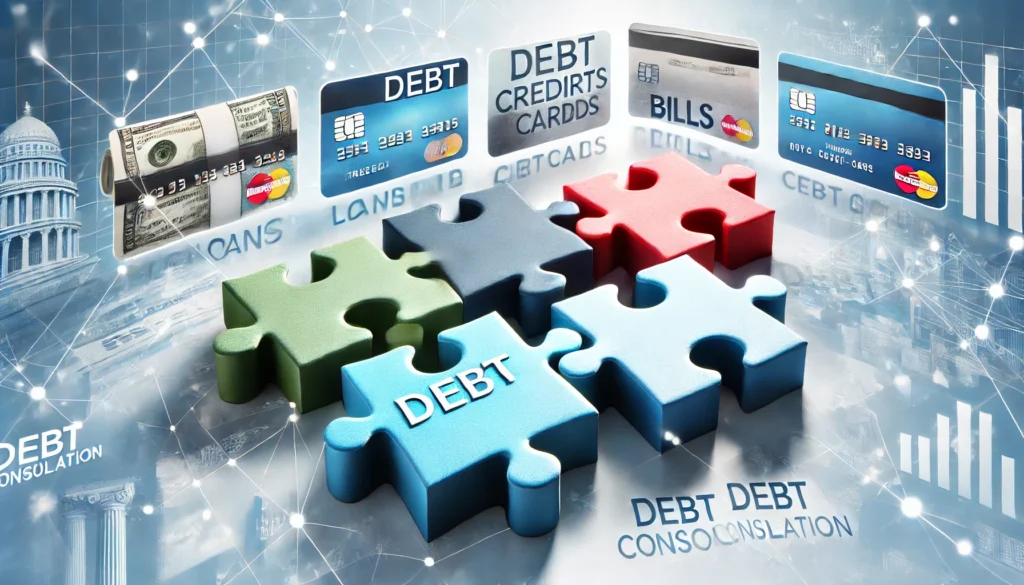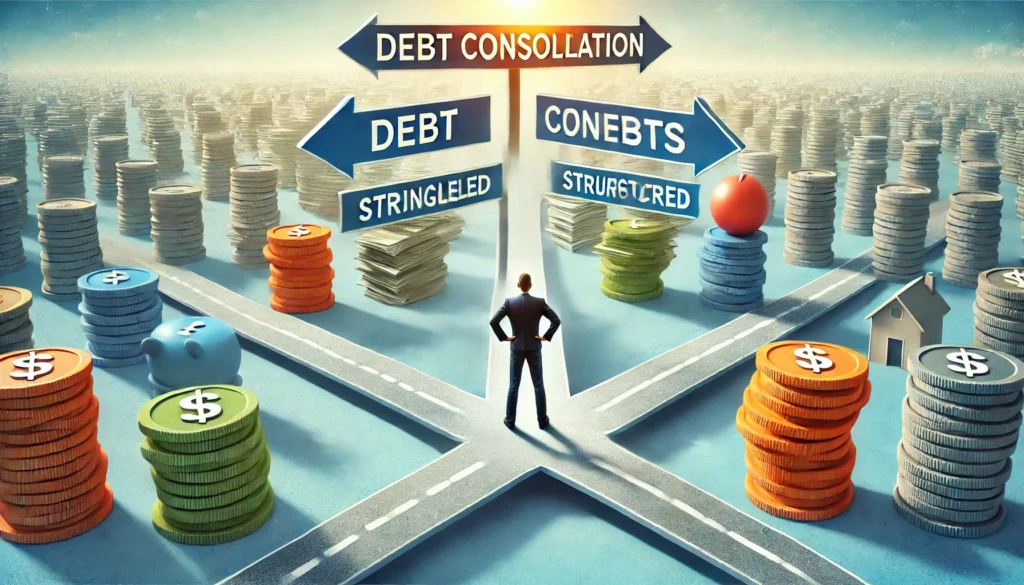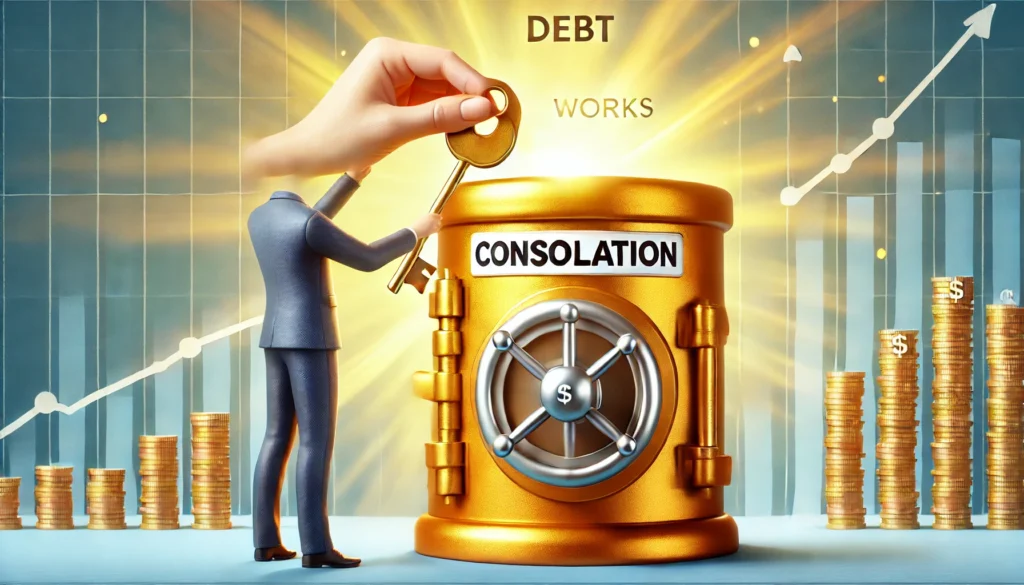Understanding Debt Consolidation and Its Benefits
Debt consolidation is a financial strategy that allows borrowers to combine multiple debts into a single loan with a lower interest rate and more manageable repayment terms. Whether someone is dealing with high-interest credit card debt, medical bills, or personal loans, a debt consolidation loan can simplify repayment and reduce financial stress. But how does debt consolidation work, and is it the right choice for every borrower?
You may also like: Federal Direct Consolidation Loan: A Smart Strategy to Simplify Student Debt
At its core, debt consolidation involves taking out a new loan to pay off multiple existing debts. This strategy can be useful for those who struggle to keep up with multiple payment due dates, fluctuating interest rates, or high minimum payments. By securing a single, predictable monthly payment, borrowers can regain control over their finances and potentially save money over the life of the loan. However, understanding the differences between consolidation loans and other debt management options is crucial before making a decision.

How Debt Consolidation Loans Work
A debt consolidation loan is a type of personal loan used to pay off multiple debts. These loans are typically unsecured, meaning they don’t require collateral, and they often have fixed interest rates. Borrowers use the loan proceeds to eliminate their existing debts, leaving them with just one monthly payment instead of several.
Many lenders offer personal loans for debt consolidation, including banks, credit unions, and online lenders. The best debt consolidation loans come with competitive interest rates, minimal fees, and flexible repayment terms. Borrowers with good credit scores usually qualify for the lowest rates, but those with less-than-perfect credit can still find options.
For those wondering, how do debt consolidation loans work? The process involves applying for a loan, getting approved based on creditworthiness, using the loan to pay off existing debts, and then repaying the consolidation loan over time. The goal is to secure a lower interest rate than the original debts to save money and make repayment easier.
Credit Card Consolidation and Its Advantages
One of the most common forms of debt consolidation is credit card consolidation, which helps borrowers manage high-interest revolving debt. Credit card balances can accumulate quickly due to compounding interest, making it difficult to pay them down. A credit card consolidation loan offers a structured way to eliminate this debt by replacing multiple balances with a single fixed payment.
For borrowers asking, how can I consolidate my credit cards? there are several options. They can use a personal loan, transfer balances to a lower-interest credit card, or take advantage of a home equity loan. Each method has advantages and risks, so selecting the right option depends on the borrower’s financial situation and credit standing.

Finding the Best Debt Consolidation Loans
Choosing the best debt consolidation loans requires careful consideration of interest rates, loan terms, and eligibility requirements. Borrowers should compare multiple lenders, read reviews, and understand the total cost of the loan before committing. The most reputable debt consolidation lenders offer transparency, competitive rates, and excellent customer service.
Some borrowers wonder, which banks offer debt consolidation loans? Major banks, credit unions, and online lenders provide a variety of consolidation loan options. Traditional banks may have stricter approval criteria, while online lenders often cater to borrowers with diverse credit backgrounds. Understanding lender requirements helps borrowers find the right fit for their financial situation.

Bill Consolidation Loans for Poor Credit
Borrowers with lower credit scores may have difficulty securing a bill consolidation loan for poor credit, but options are still available. Some lenders specialize in debt consolidation loan bad credit programs, offering competitive terms for borrowers with less-than-perfect credit histories. These loans often come with higher interest rates, but they can still provide financial relief by simplifying multiple payments into one.
For those asking, how do I get a debt consolidation loan with bad credit? The key is to improve creditworthiness by making timely payments, reducing outstanding balances, and considering secured loans if necessary. Some lenders also offer co-signed loans, which can help borrowers qualify for better terms.
Debt Consolidation Loan for U.S. Resident Aliens
Resident aliens in the U.S. often face challenges when applying for financial products, but they may still qualify for a debt consolidation loan for U.S. resident alien borrowers. Lenders typically require proof of residency, income, and a valid Social Security number or Individual Taxpayer Identification Number (ITIN). Those who meet these requirements can access the same consolidation options as U.S. citizens.
Weighing the Pros and Cons of Debt Consolidation
Borrowers frequently ask, is a debt consolidation loan a good idea? The answer depends on individual financial goals and circumstances. The primary benefits include lower interest rates, simplified repayment, and potential savings over time. However, consolidation is not a cure-all for debt problems, and it requires financial discipline to avoid accumulating new debt after consolidation.
Understanding how debt consolidation works helps borrowers make informed choices. It is essential to compare different solutions, assess financial habits, and seek professional guidance if needed. Some borrowers may find that alternatives like debt settlement, credit counseling, or income-driven repayment plans offer better solutions for their needs.
Where to Get a Debt Consolidation Loan
For those wondering, where to get a debt consolidation loan, many options are available, including banks, credit unions, and online lenders. Each lender has different approval criteria, so researching multiple options is essential. Borrowers should compare interest rates, fees, and loan terms to ensure they are making the best financial decision.
For individuals wondering, how can I get a consolidation loan? the process typically involves checking credit scores, gathering financial documents, and applying with lenders offering favorable terms. Understanding how does a debt consolidation loan work ensures that borrowers are prepared for the financial commitment and can take advantage of lower interest rates and better repayment structures.
Is Debt Consolidation Worth It?
A common question borrowers ask is, is debt consolidation worth it? The answer varies based on financial circumstances. Debt consolidation works best for those who have high-interest debt and can qualify for a lower-rate consolidation loan. However, it is not ideal for borrowers who struggle with financial discipline or who may continue accumulating new debt after consolidation.
To ensure success, borrowers should focus on making consistent payments, avoiding new debt, and budgeting responsibly. By fully understanding what does debt consolidation mean and how to use it effectively, individuals can work toward long-term financial stability.
Frequently Asked Questions (FAQ)
How does a debt consolidation loan work?
A debt consolidation loan works by combining multiple outstanding debts into a single loan, often with a lower interest rate and more manageable repayment terms. Instead of juggling multiple payments, borrowers make one fixed monthly payment, which simplifies financial management. The success of a debt consolidation loan depends on securing favorable loan terms that genuinely reduce the overall cost of debt. While consolidation can lower interest rates and improve cash flow, borrowers must avoid accumulating new debt to prevent further financial strain. Evaluating repayment terms and understanding how a debt consolidation loan works can help borrowers make an informed decision about whether it’s the right financial strategy for them.
What are the benefits of debt consolidation compared to other debt relief options?
Debt consolidation offers several advantages over alternatives like debt settlement or bankruptcy. Unlike settlement, where part of the debt is forgiven but credit scores may take a hit, consolidation allows borrowers to maintain a strong credit profile. Consolidation loans also provide fixed repayment schedules, reducing uncertainty about when debts will be paid off. Additionally, the best debt consolidation loans often come with lower interest rates than credit cards, making repayment more affordable over time. However, borrowers should assess how debt consolidation works in their specific financial situation to ensure it aligns with their long-term goals.
Is a debt consolidation loan a good idea for everyone?
A debt consolidation loan is a good idea for those who can secure a lower interest rate and have the financial discipline to manage a single monthly payment responsibly. Borrowers who qualify for the best debt consolidation loans can save significantly on interest, making repayment easier. However, those with a history of late payments or inconsistent income may struggle to keep up with the loan, leading to further financial stress. It’s crucial to consider whether consolidation will genuinely alleviate debt burdens rather than postponing financial difficulties. Understanding how a debt consolidation loan works ensures borrowers choose the right option based on their circumstances.
How do I get a debt consolidation loan with bad credit?
Getting a debt consolidation loan for bad credit can be challenging but not impossible. Some lenders specialize in working with borrowers who have lower credit scores, though they may offer higher interest rates. A bill consolidation loan for poor credit might require collateral, such as a home or car, to secure better terms. Borrowers can also improve approval chances by demonstrating stable income, reducing outstanding debt, or applying with a co-signer. Researching which banks offer debt consolidation loans for those with bad credit can help find a lender willing to accommodate financial circumstances.
How can I consolidate my credit cards into a single payment?
A credit card consolidation loan allows borrowers to merge multiple high-interest credit card balances into one fixed monthly payment. This can be done through a personal loan for credit card debt, a balance transfer credit card, or a home equity loan. By using a loan to pay off credit cards, borrowers can reduce interest rates and simplify financial management. However, to maximize the benefits, it’s essential to avoid accumulating new credit card debt while repaying the consolidation loan. Exploring how to consolidate credit card debt effectively can help individuals regain financial stability.
How do consolidation loans work compared to personal loans?
While both consolidation loans and personal loans can be used to pay off existing debts, they differ in purpose and structure. A personal loan for debt consolidation is specifically designed to combine multiple debts into a single payment, often at a lower interest rate. Traditional personal loans, on the other hand, can be used for various purposes, including emergency expenses, home improvements, or travel. The best debt consolidation loans typically have fixed repayment terms and structured payments, whereas personal loans may offer more flexibility. Understanding how consolidation loans work helps borrowers determine which option is most suited to their financial needs.
Where to get a debt consolidation loan with competitive terms?
Debt consolidation lenders include traditional banks, credit unions, online lenders, and peer-to-peer lending platforms. Comparing which banks offer debt consolidation loans with the lowest interest rates and best repayment terms is crucial for securing the most favorable deal. Online lenders often provide quick approval processes and competitive rates, while credit unions may offer lower rates for members. Borrowers should use online calculators to estimate repayment costs before committing to a loan. Knowing where to get a debt consolidation loan ensures that individuals choose the best option for their financial situation.
How can a bill consolidation loan help manage monthly expenses?
A bill consolidation loan combines multiple bills, such as credit card payments, medical expenses, and personal loans, into one fixed monthly payment. This makes budgeting easier by reducing the number of separate payments each month. For those with poor credit, a bill consolidation loan for poor credit may provide relief by extending repayment terms, though interest rates may be higher. Borrowers should carefully review loan terms to ensure the consolidation loan results in real savings. Properly managing a bill consolidation loan can help prevent late fees and reduce financial stress.
How does debt consolidation impact credit scores?
Initially, applying for a debt consolidation loan may cause a small dip in credit scores due to the hard inquiry from lenders. However, over time, making consistent payments on the consolidation loan can improve credit by reducing outstanding balances and lowering credit utilization ratios. A credit card consolidation loan, for example, can help borrowers eliminate high-interest revolving debt, which positively impacts credit scores. However, missing payments on a consolidation loan can hurt credit just as much as missing payments on individual accounts. Understanding how debt consolidation works ensures borrowers maintain good credit habits after consolidating debt.
Is debt consolidation worth it in the long run?
Debt consolidation is worth it if it leads to lower interest costs, simplified financial management, and improved repayment discipline. For borrowers struggling with multiple debts, a debt consolidation loan can be a practical tool for regaining financial stability. However, it’s essential to compare the total repayment amount under consolidation versus maintaining separate debts to ensure real savings. Those with a history of accumulating debt should also focus on financial habits that prevent future financial strain. Understanding how debt consolidation works and weighing the long-term benefits can help determine whether it’s the right choice.
Final Thoughts: Taking Control of Your Debt
Debt consolidation can be a powerful tool for managing credit card and loan debt. By understanding how do consolidation loans work, borrowers can take advantage of lower interest rates, simplified payments, and potential savings. However, success depends on choosing the right loan, practicing responsible financial management, and avoiding the pitfalls of accumulating new debt.
Borrowers should carefully evaluate their options, compare lenders, and consider seeking financial advice before committing to consolidation. With the right strategy, debt consolidation can lead to improved financial health and long-term debt relief.
credit card debt relief, managing personal loans, responsible borrowing, financial literacy, loan repayment strategies, budgeting tips, debt reduction plans, financial planning, credit score improvement, smart loan management, money-saving strategies, debt refinancing options, interest rate negotiation, best personal loans, student loan consolidation, financial independence, alternative debt solutions, loan affordability analysis, money management for graduates, financial stability strategies
Further Reading:
What Is Debt Consolidation and When Is It a Good Idea?
What Is Debt Consolidation and How Does It Work?
The information provided in this article is for general informational purposes only and is not intended to constitute financial, investment, legal, tax, or other professional advice. The content should not be relied upon for making any financial or investment decisions. Readers are encouraged to consult with licensed professionals, such as financial advisors, attorneys, or tax experts, to obtain personalized advice tailored to their individual circumstances. The author and publisher disclaim any liability for any actions taken or not taken based on the information provided in this article.





